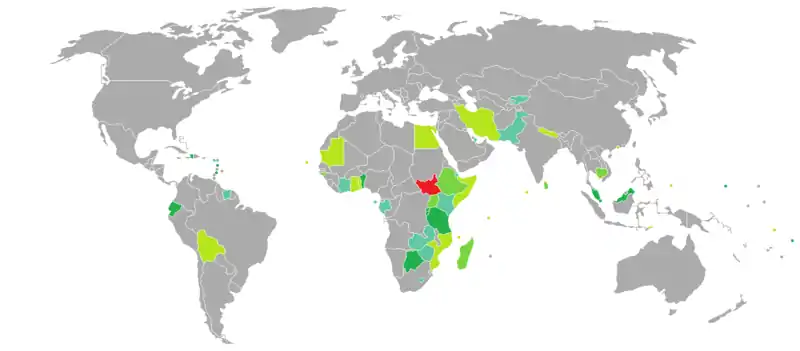South Sudanese nationality law
The South Sudanese nationality law dates back to 7 July 2011,[1] when South Sudan declared independence. It is based upon the Constitution of South Sudan.
| South Sudanese Citizenship plan | |
|---|---|
 | |
| Parliament of South Sudan | |
| |
| Enacted by | Government of South Sudan |
| Passed | 9 June 2004 |
| Status: Current legislation | |
Acquisition of South Sudanese citizenship
South Sudanese citizenship can be acquired in the following ways:
- Jus sanguinis: By descent if at least one of the parents is a South Sudanese citizen.[2]
- Jus soli: By birth in South Sudan (unless citizenship of another country has been acquired by descent), or a child found in South Sudan whose parents are unknown.[3]
- By naturalisation
South Sudanese nationality law was adopted immediately after the secession of South Sudan from Sudan and Article 8 states that:
"(1) A person born before or after this Act has entered into force shall be considered a South Sudanese National by birth if such person meets any of the following requirements— (a) any Parents, grandparents or great-grandparents of such a person, on the male or female line, were born in South Sudan; or (b) such person belongs to one of the indigenous ethnic communities of South Sudan.
(2) A person shall be considered a South Sudanese National by birth, if at the time of the coming into force of this Act— (a) he or she has been domiciled in South Sudan since 1.1.1956; or (b) if any of his or her parents or grandparents have been domiciled in South Sudan since 1.1.1956.
(3) A person born after the commencement of this Act, shall be a South Sudanese National by birth if his or her father or mother was a South Sudanese National by birth or naturalization at the time of the birth of such a person.
(4) A person who is or was first found in South Sudan as a deserted infant of unknown Parents shall, until the contrary is proved, be deemed to be a South Sudanese National by birth." [4]
Dual citizenship
South Sudan allows its citizens and other countries citizens to hold foreign citizenship in addition to their South Sudanese or home citizenship. Some countries, however, do not permit multiple citizenship e.g. adults who acquired South Sudanese and Japanese citizenship by birth must declare, to the latter's Ministry of Justice, before turning 22, which citizenship they want to keep.
Travel freedom of South Sudanese citizens

Visa requirements for South Sudanese citizens are administrative entry restrictions by the authorities of other states placed on citizens of South Sudan. As of 1 January 2017, South Sudanese citizens had visa-free or visa on arrival access to 145 countries and territories, ranking the South Sudanese passport 96th in terms of travel freedom (tied with Ethiopian, Kosovan and Lebanese passports) according to the Henley visa restrictions index.[5]
References
- [citizenshiprightsafrica.org/south-sudan-nationality-act-2011/ South Sudan Nationality Act, 2011 : Citizenship Rights in Africa Initiative]
- [citizenshiprightsafrica.org/south-sudan-nationality-act-2011/ South Sudan Nationality Act, 2011 : Citizenship Rights in Africa Initiative]
- [citizenshiprightsafrica.org/south-sudan-nationality-act-2011/ South Sudan Nationality Act, 2011 : Citizenship Rights in Africa Initiative]
- [citizenshiprightsafrica.org/south-sudan-nationality-act-2011/ South Sudan Nationality Act, 2011 : Citizenship Rights in Africa Initiative]
- "Global Ranking - Visa Restriction Index 2017" (PDF). Henley & Partners. Retrieved 14 March 2017.